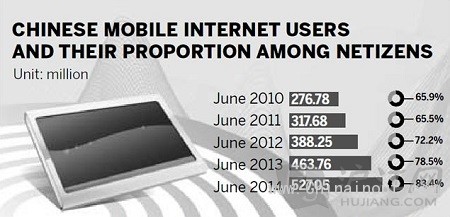
周一发布的一份互联网发展报告显示,中国手机上网人数首次超越电脑上网人数。
根据中国互联网络信息中心(CINIC)的一份报告,上半年中国网民数量增长了1442万人,83.4%的网民使用手机上网。
报告称,截止6月底中国网民总数达到6.32亿,其中5.27亿网民使用手机上网。
CINIC副主任刘冰说,这是手机上网人数首次超越传统PC(台式机和笔记本电脑)。
他说,“换句话说,我们可以认为手机是中国网民的重要上网终端。”
他还表示,随着移动网络引领国内互联网的发展,手机上网在网民中的地位也会变得更为稳固。
手机用户人数增长推动了电子商务、即时通讯和娱乐应用的快速发展。“反映了网民的多元化需求”,他说。(更多资讯请点击浏览)
根据该报告,今年1月至6月,手机支付用户人数增长了63.4%,支付应用的发展也十分迅猛。
刘冰说,“移动支付变得越来越贴近消费者,对电子商务发展做出的贡献越来越大。”
移动互联网分析师尹晶雪也表示,移动设备在中国互联网发展中的作用变得更为重要。
尹晶雪说,“在移动互联网使用人群中,如微博和微信等即时通讯应用的使用率最高,接下来是网络购物应用,包括淘宝和京东。”
移动互联网用户以20-40岁人群为主,她补充道,他们还更愿意尝试新的应用。
她认为手机不会代替电脑,表示“不同的互联网用户会找到自己不同的上网渠道,而我们要根据他们不同的需求来推广应用。”
The number of people who surf the Internet via mobile devices in China has for the first time exceeded the number using computers to go online, an industry report said on Monday.
The number increased by 14.42 million over the past six months, so that now 83.4 percent of China’s Internet surfers are using mobile phones to go online, according to the report issued by the China Internet Network Information Center, a government-backed industry administrative body.
The total number of Chinese netizens was 632 million by the end of June, 527 million of whom logged onto the World Wide Web through their smartphones, the report said.
It is the first time that the number of mobile Internet users has surpassed that of those surfing the Web in traditional ways, such as with personal computers and laptops, said Liu Bing, deputy director with the CINIC.
"In other words, the mobile phone can be regarded as the key terminal device for Chinese to get online,” he said.
As the mobile network has taken the lead in the country’s Internet development, its status has also become firmer among netizens, he said.
The increasing number of smartphone owners has driven a rapid rise in e-commerce, instant messaging and entertainment applications, “which reflects a diverse demand of netizens”, he said.
According to the report, the number of users who use mobile phones to make payments has increased 63.4 percent from January to June, with the growth of payment apps likewise surging in that period.
“The mobile payment is becoming much closer with consumers and it has been making greater contributions to e-commerce development,” Liu said.(更多资讯双语请点击浏览)
Yin Jingxue, a mobile Internet analyst, //confirm/i/ied that mobile devices have played the more important role in Web development in the country.
“Instant messaging applications such as Weibo and Wechat are still used the most among mobile Internet users, followed by online shopping apps, including Taobao and Jingdong,” Yin said.
People aged 20 to 40 are the main mobile Internet users, Yin said, adding that they are more likely to try new applications.
She said she does not think that mobile devices will replace computers. “Instead, different Internet users will find their own channels to get online and apps will be promoted in accordance with their various demands,” she said.











